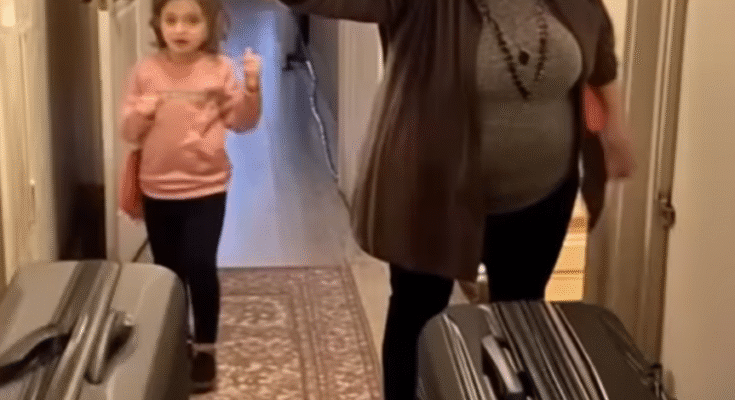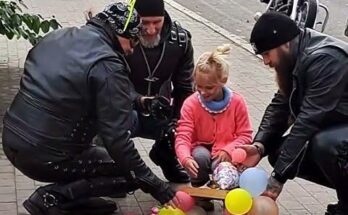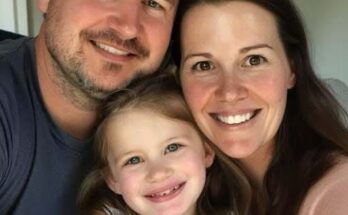“My granddaughter,” my mother said softly, “will always have a room wherever her mother is. And if anyone has a problem with that… they can find somewhere else to stay.”
She didn’t raise her voice. She didn’t have to. Her words hit like a thunderclap in that tiny dining room. Deborah blinked, visibly stunned—but still standing tall, one hand clutching the handle of her suitcase
Todd… didn’t say a word.
I wanted him to. I needed him to. But he just stood there, lips slightly parted like he was about to speak, but couldn’t find the words. My stomach sank.
The rest of the evening unraveled in awkward goodbyes and quiet exits. My mother stayed behind to help me get Meredith to bed. We didn’t talk much, but before she left, she whispered, “Don’t let anyone make your child feel less than. Ever.”
That night, I laid awake staring at the ceiling while Todd slept beside me, snoring like it was any other night. I couldn’t stop replaying everything—Deborah’s words, his silence, the way Meredith’s little hands clung to my dress.
The next morning, Deborah was already in the kitchen, rearranging cabinets and muttering about “making the place functional.”
Meredith’s door? Closed. Deborah had moved in overnight.
I lost it.
I told Todd we needed to talk, right then and there. We stood in the hallway, his mother just feet away, pretending not to listen. I asked him point-blank why he hadn’t stood up for Meredith. For us.
He rubbed the back of his neck, wouldn’t look at me. “She’s just old, stuck in her ways. She didn’t mean it.”
“She meant every word,” I said. “You didn’t say anything. That told me everything I needed to know.”
He finally snapped, “I’m stuck between my wife and my mother. What do you want me to do?”
I stared at him.
“Pick a side.”
For a moment, I thought he would. But then he walked away. Didn’t say a word. Just… left me standing there.
The days that followed were chaos. Deborah was everywhere—criticizing what I cooked, how I dressed Meredith, making snide comments like, “When my son has children, they’ll be raised right.” Every dig, every jab, she made sure Meredith could hear.
One night, Meredith asked me, “Mommy… did I do something bad? Why doesn’t Grandma like me?”
My heart cracked.
That was it.
I called my mother, packed a few bags, and left. Just like that. I didn’t yell. Didn’t make a scene. I just took my child and went.
Todd didn’t call that night. Or the next. Three days later, he finally showed up at my mom’s place, looking worn and full of apologies. He claimed Deborah had “nowhere else to go,” that he’d tried to talk to her, but “she’s just difficult.”
I looked at him and asked, “Is this the life you want for our family?”
He didn’t answer.
He just said, “Please come back.”
I told him no.
I said I needed someone who protected my daughter without hesitation. Someone who understood that “family” doesn’t mean biology—it means loyalty. And that Meredith deserved a father who’d fight for her, not one who’d shrink into the background when things got uncomfortable.
It hurt. God, it hurt. But I walked away. And I didn’t look back.
It took months, but I found a small apartment near my mom’s place. I took on extra shifts at the bakery. Things were tight, but we had peace. Laughter. Butterfly drawings taped to the fridge.
One afternoon, I got a message on Facebook from a woman named Danya. She wrote: “I don’t know you, but I think we share something in common. I used to be married to Todd.”
I stared at the screen for a long time.
We met for coffee. Turns out, she had her own stories about Deborah’s control, about Todd’s spinelessness, about how he’d let her drown in responsibilities while his mother criticized everything she did.
It was strange… but healing.
I wasn’t crazy. I wasn’t alone. And Meredith wasn’t the problem. We never were.
A year later, I met someone. His name’s Eron. Quiet. Steady. The kind of man who brought Meredith a tiny potted plant on our second date because she “seemed like the type who’d like to grow things.”
He never once made her feel like she didn’t belong.
And that’s the thing I learned in all of this:
Love isn’t about who says the right things when it’s easy. It’s about who shows up when it’s hard.
Don’t stay where your child isn’t welcomed. Don’t confuse tolerance with love. And don’t ever shrink yourself to fit into someone else’s version of “family.”
You deserve peace.
And your kids? They deserve to see you fight for it.
💬 If this story moved you or reminded you of your own journey, please share it. You never know who might need to hear it today.



